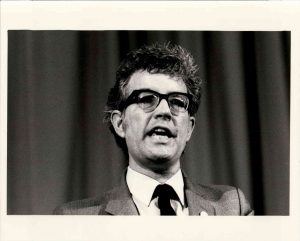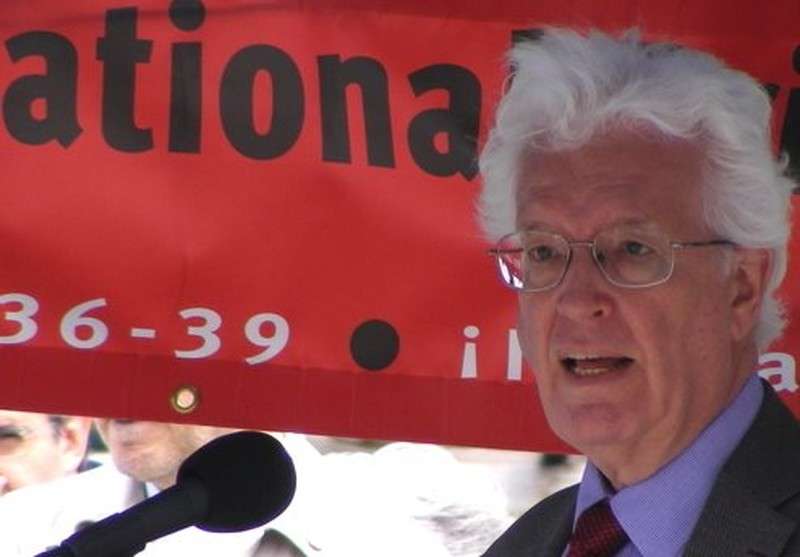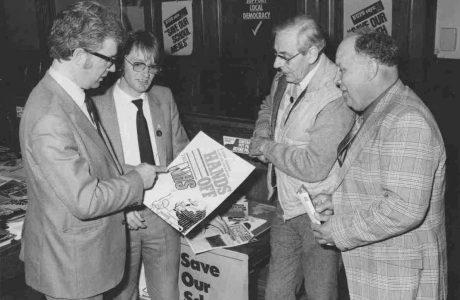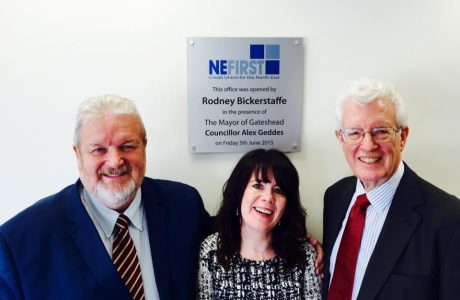 In the 1980s I was responsible for NUPE membership in MK. The branch secretary and I spoke regularly on the phone in the evenings. Our conversations were interspersed with clicks and bangs and on one occasion part of our conversation was played back to us. We were convinced our phone was tapped. We never discussed anything subversive, often only talking about an epidemic of repetitive strain injury caused by our members being asked to plant trees in frozen ground using a crow bar. And rumours of a takeover of the refuse collection service by Exclusive Cleaning, a firm run by an Essex wide boy. One of our senior stewards was a leading light on the local Trades Council. He met Rodney at a TUC conference. Rodney was very interested in the industrial relations developments in MK.
In the 1980s I was responsible for NUPE membership in MK. The branch secretary and I spoke regularly on the phone in the evenings. Our conversations were interspersed with clicks and bangs and on one occasion part of our conversation was played back to us. We were convinced our phone was tapped. We never discussed anything subversive, often only talking about an epidemic of repetitive strain injury caused by our members being asked to plant trees in frozen ground using a crow bar. And rumours of a takeover of the refuse collection service by Exclusive Cleaning, a firm run by an Essex wide boy. One of our senior stewards was a leading light on the local Trades Council. He met Rodney at a TUC conference. Rodney was very interested in the industrial relations developments in MK.
Thatcher was brought in to open the then new Central Milton Keynes Shopping Mall. The Trades Council discovered the entrance that Thatcher would use and arranged a protest at very short notice. The night before, the branch secretary made a prearranged call to me to advise of the demonstration arrangements. He deliberately mentioned a false location for the protest. Sure enough the police turned up in numbers in the wrong location. Only overnight was Rodney able to agree to address the protest. We dispatched a driver to pick him up at the station. When I arrived at the protest a Police Superintendent immediately approached me, not the protest organisers, to ask where Mr Bickerstaffe was. I only knew an hour earlier that Rodney was able to make it. And why was I approached for the information? Our driver said that an unmarked vehicle followed their car all the way from the station. I know that this was in the middle of the Troubles but I thought that the security was well over the top, and misdirected.
Rodney gave a barnstorming speech, denouncing Thatcher and all her works. Two elderly ladies wielding umbrellas tried to get at him whilst shouting “leave her alone, she is a lovely lady.” Rodney survived, protected by two WPCs.
Oxford employer loses first strike in nearly 400 years
Rodney was a key player in setting up national collective bargaining arrangements for non-teaching staff in Universities. (I apologise to colleagues in Scotland and Northern Ireland), as I cannot recollect whether they had their own arrangements). The working title was the Committee for University Non-Teaching Staff, until Rodney pointed out its unfortunate acronym.
Once established, Rodney urged NUPE organising staff to recruit new members, seek recognition and get the national pay and conditions applied. Rodney said that he had established good relations with NALGO, ASTMS, MATSA, (the white collar section of the GMB) sand the equivalent in the TGWU. He asked us to concentrate on manual workers. Unfortunately Oxford University itself had very few manual workers. Being a collegiate University, most manual workers were employed by Colleges and Halls. Many of the college “servants” had traditional job titles like “stair case bedders” and the university proctors employed bowler-hatted “Bulldogs” with college based equivalents to oversee these underlings.
Alf Collier, responsible for our Oxford membership, set about implementing Rodney’s injunction with gusto. Alf met considerable resistance. Staff were warned that if national conditions applied then they would lose their Christmas perks, e.g. a brace of pheasants. Others lived in college-owned homes and that was a more serious threat.
The Pembroke College NUPE members struck. The College was founded in 1624 by James I of England/James VI of Scotland. Horrors amongst the establishment. The eventual publicity led to every politico in the University, its student body, and those from the polytechnic wanting a slice of the action. There were also political activists from local industry interfering, some of whom had close NUPE connections. Alf had the unenviable task of keeping these external actors at arms’ length to concentrate on the objectives of the strike, whilst maintaining the support of the local Labour movement. Every night Rodney rang Alf to talk things over and to give support.
Rodney soon used his national connections to get Lord McCarthy of Nuffield College involved, a Labour peer, who might have been on the ACAS council at the time. He was eventually accepted as a mediator and recommended recognition and adoption of the national conditions. Pembroke accepted. Alf then had the long task of using this as a precedent and set about trying to roll the agreement out to many other Colleges and Halls, who mostly claimed unique circumstances to justify their avoidance.
Postscript: A father came into the Oxford office in tears. He said that his daughter was an apprentice cook at Pembroke. The adoption of national pay rates meant that she got over a 100% pay rise. He knew that she was being underpaid hitherto but jobs were difficult to find for young people in the 1980s, especially those offering a modicum of training. He and his daughter had to accept that situation until Rodney’s and Alf’s efforts had been successfully concluded. Rodney was a fervent advocate of the national minimum wage.
Area Officer London 1972, London Offices
Area Officer SE Division 1976, St Pauls Cray Office
ADO SW Division 1979-1988, Oxford Office.




